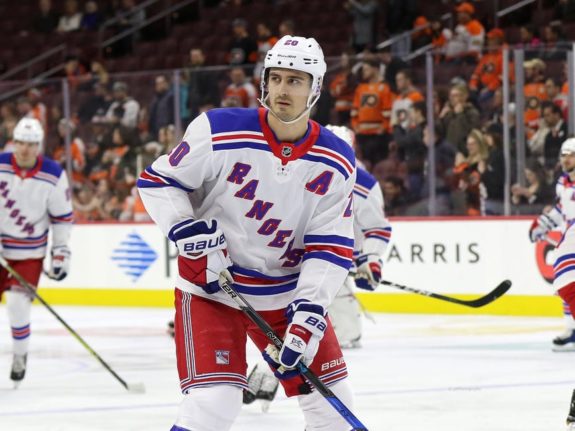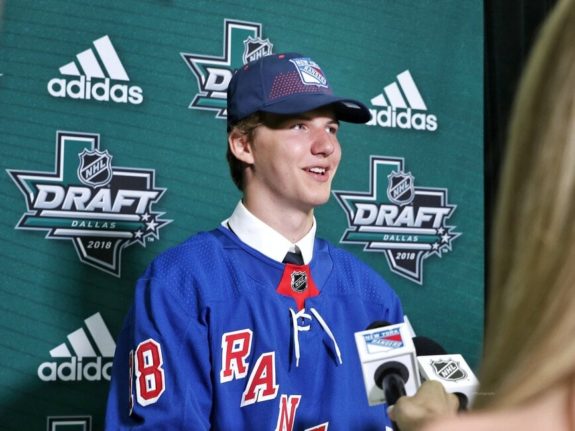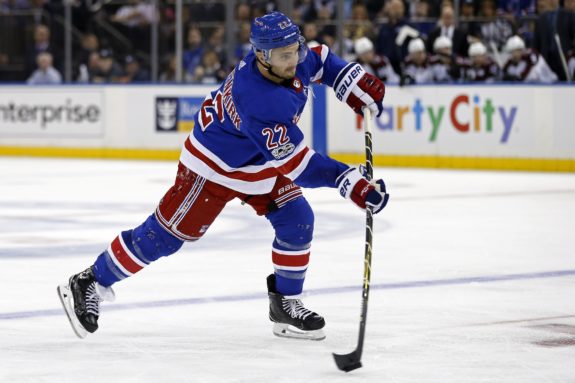One of the most exciting New York Rangers offseasons in a long time has now brought the club squarely into the middle of its “Hard Choices” period.
A whirlwind month-plus that yielded Jacob Trouba, Kaapo Kakko, Artemi Panarin and Adam Fox in a drastic acceleration of their rebuilding project has left the Rangers in dire straits when it comes to the salary cap – specifically, nearly $1 million over the $81.5 million threshold for the 2019-20 season.
The time for euphoria is over, the time for cold, difficult personnel moves is here. Disposing of some players to get under the cap is a certainty; the challenge for general manager Jeff Gorton is to cut ties with the right ones and in a way that provides maximum benefits for the club in the near future.
Chris Kreider, the longtime Ranger who isn’t quite a star, represents one of the most difficult decisions. The devil’s bargain of buying out at least one of the Rangers’ three big-money veteran defenseman, a move that generates instant gratification before the bill comes due in coming seasons, is no doubt being seriously considered.

The Blueshirts, of course, need to do more than just get under the cap after inking Trouba to a seven-year, $56-million extension and lavishing $81.5 million on Panarin. They could need an additional $10 million or more of space to sign restricted free agents Pavel Buchnevich, Tony DeAngelo and Brendan Lemieux.
The Rangers should be able to ink DeAngelo and Lemieux to two-year bridge deals that won’t be for huge amounts of money. Buchnevich, though, represents a bigger danger – both in salary and the question of whether to trade his rights to alleviate pressure on the payroll, which has been recently reported as a possibility for the Blueshirts.
Trading a Rising Buchnevich Would Be Risky
The fourth-year winger has his arbitration hearing scheduled for Monday, a process the front office will do everything to avoid. Buchnevich’s performance has improved for two straight seasons since his debut in 2016-17. Now coming off a season in which he scored 21 goals in just 64 games, the cap-strapped club risks losing control of its financial situation should an arbitrator be allowed to decide the Russian’s salary for 2019-20.
Buchnevich is young and talented, and dealing him away would make cap compliance substantially easier for the Rangers. Yet trading the 2013 third-round pick could prove to be a bigger mistake for Gorton than walking into the arbitration hearing relying on luck and hope.

Gorton is faced with evidence that a potential breakout for this young forward, overshadowed throughout the offseason by the arrival of Vitali Kravtsov, Kakko and then Panarin, could be imminent. Coach David Quinn’s tough-love benchings appeared to turn the light on for the 24-year-old, who delivered 12 goals over his last 27 games, many from close in around the net as Quinn had preached throughout the season.
Despite the facts that he remains relatively unproven, that he’s still adjusting to the culture and that he’s a left-handed shot, he struggled with positioning last season when Quinn tried him briefly on the left side, the Rangers might be better off keeping Buchnevich over Kreider – if it indeed comes to that.
In addition to the late surge and the clear fact that Quinn is able to get through to him, all signs point to Buchnevich being in the perfect position to make another leap next season. Fellow Russian Panarin, among the top offensive players in the NHL, should be able to provide cover and take the pressure off Buchnevich to deliver every night – something that wasn’t the case last season with the Rangers starved for elite offensive talent.
Add in Kravtsov, another Russian forward drafted ninth-overall in 2018 who opened eyes with an impressive performance at development camp last month, and it’s possible that Buchnevich couldn’t be in a better place – for both himself and the Rangers. Next season’s spotlight should hardly be on the holdover from 2018-19, not with Panarin now plying his trade on Broadway and the highly-touted Kakko and Kravtsov under the microscope in their first NHL season – if they make the roster, of course.

So, if push comes to financial shove, Buchnevich’s untapped potential should outweigh the certainty that is Kreider’s game. Buchnevich, of course, doesn’t possess the attributes of Kreider, whose brawn around the net and straight-ahead speed is desperately needed on the roster. There’s a degree of redundancy amongst the games of Buchnevich, Panarin, Kravtsov and Kakko that could prove problematic once the season starts.
Kreider Valuable, but May Have Hit His Ceiling
And yet, it’s probably a good bet that Kreider has topped out at age 28. He’s a streaky player who’s good for 25 or so goals per season as long as the Rangers are willing to continue tolerating extended stretches of little or no production. He’s also about to get a lot more expensive, with his $4.625 million salary for next season set to rise into the $7 million-per range for six or seven years after that, a ballpark figure that it would take to get him signed long term.
Again, if it comes to choosing between Buchnevich and Kreider, who at times have worked formidably as linemates, for salary cap reasons, what makes more sense? Four years from now, do the Rangers want Buchnevich in his ostensible prime at 28, or a conceivably declining Kreider at 32 with perhaps four years left on a huge contract extension?
It’s possible that there is more to come for Kreider after a career-high-tying 28-goal season, during which injuries may have contributed to him delivering only two goals over his final 17 games. Are the Rangers willing to bet on that, though? How many times has similar reasoning been employed after seasons in which Kreider delivered flashes of his vast ability, but his production that didn’t match?
Inking Kreider to a big contract rather than trading him creates the need for more drastic action to get under the cap and makes it perhaps more likely that the club won’t be able to afford Buchnevich.
Vladislav Namestnikov ($4 million cap hit) is also reported to be on the trading block for the purpose of opening up space, and Ryan Strome ($3.1 million) could be dealt as well for salary relief. Moving those two forwards alone, however, won’t be enough to create enough room for Buchnevich, DeAngelo and Lemieux.
Buyout Won’t Create Enough Cap Space
Even with what looks like an all-but-unavoidable buyout of Kevin Shattenkirk, Brendan Smith or Marc Staal paired with those theoretical trades, the Rangers will need more space. In effect, it may come down to the club choosing a future with Buchnevich or Kreider, but not both.
Kreider’s power-and-speed game, a commodity in today’s NHL, would be sorely missed. Selling off Buchnevich in order to save money and watching him continue to rise, though, would be more painful.

The decisions on these two forwards are likely to be agonizing for the front office, a topic that’s surely occupied Gorton, new team president John Davidson and the rest of the brass for some time. It’s a long way from the thrill of adding Panarin with the third-best contract offer amongst suitors, the slam-dunk drafting of Kakko with the second overall pick, grabbing Trouba from the Winnipeg Jets in a lopsided trade or even the acquisition of top defensive prospect Fox from the Carolina Hurricanes.
The high of that period is over. Uncomfortable decisions are imminent. Keeping Buchnevich over Kreider, if it comes to that, should be the least uncomfortable choice amongst numerous difficult ones.